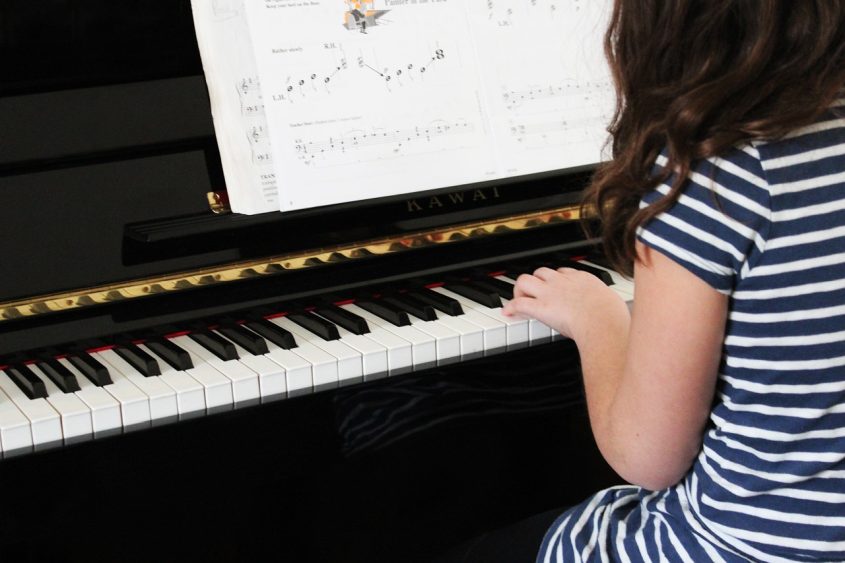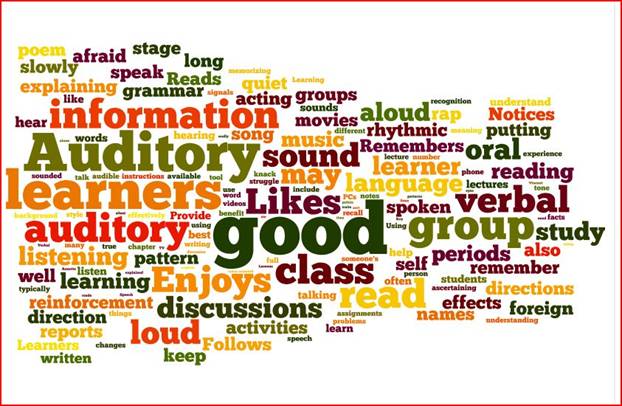
In my child assessments, I check children’s communication styles. I have been doing this for so long that my family members can sometimes identify the kids with the auditory communication style right away, because they talk. A lot!
I usually pay attention to the way they use verbal stimulation to memorize things, if they whisper as they work and if they can repeat numbers and sounds. I also check the way they respond to verbal encouragement. Generally, they do much better when they can control their auditory space than when they are restricted.
Auditory kids are very influenced by the sounds around them and are unable to block them. They are very sensitive to arguments, shouting, yelling, crying, whining and scolding. Some of them say they feel pain when their teacher or parent shouts. Communicating with them in a loud voice may cause them to shut down completely. On the other hand, speaking to them in a soft, calm voice supports their learning greatly.
Children with the auditory communication style can learn anything, as long as it is associated with sound effects, a funny voice, an accent or even a lisp.
When talking to an auditory child (or adult), use auditory words from this list:
 Talk / speak
Talk / speak- Listen / hear
- Cry
- Scream / shout
- Whisper
- Loud
- Quiet / silence
- Sound
- Noise
- Tone
- Ring
- Buzz
- Hum
- Tune
- Music
Teachers should use these children’s strong auditory abilities to facilitate their learning. This communication style may be a challenge at school, especially in high school, because of insufficient awareness and acceptance of communication styles in the school system and because only 20% of children are auditory, which makes them a minority.
One of the difficulties auditory children face is that people around them do not understand their behavior. After people treat them as if something is wrong with them for a while, they start thinking and behaving as if something might actually be wrong with them, and this makes things harder to change.
Self-talk is a typical behavior of auditory kids (and adults) and it is very important that people who work with them do not treat this behavior as abnormal or distracting. In fact, self-talk is essential for auditory people’s thinking and development.
When auditory children’s self-talk is restricted, their stress level increases, they becomes confused and frustrated and their self-confidence and self-image are threatened, which further increases the need for self-talk. In fact, when given an auditory outlet, their need for self-talk decreases.
Unfortunately, many auditory children are misdiagnosed as having Attention Deficit Disorder and trapped in a negative self-fulfilling prophecy of abnormal behavior. In my experience, after assessing hundreds of children over the years, most auditory kids do not have organic ADD, ADHD or ODD, even when some of the symptoms seem similar.
How to Help Auditory Kids Learn
Here are several ways to help kids be “in the auditory zone”, learn better, listen more, be happier and love to learn:
- When talking to them, make sure your voice is soft. No matter what happens, do not raise your voice or speak in a sharp tone.
- Allow them to whisper and talk to themselves. Allow them to talk through what they are doing. Talk to them while they work and ask them open questions about what they are doing to help them verbalize their thoughts (avoid court-style questions to “lead the witness”).

- Use music and sounds when you teach. This excellent option stimulates and motivates kids with the auditory communication style. Find out what kind of music they like and use it to set their mood before, during (softly, in the background) and after learning (as a reward). If the music contains words relating to the topic of learning, auditory kids learn the topic more quickly.
- Encourage them to take part in rhythm and music activities like dancing, singing and playing a musical instrument.
- Having background music they like may contribute to storing information better, because the information is linked to the sounds.
- Encourage auditory children to play a musical instrument, not for the sake of performance, but to stimulate them through the auditory channel and to help them control their auditory space in a productive and pleasant way. Playing an instrument will make them proud of themselves and better academically, without having to study more. This effect increases over time, so it is best to start early.
- Teach them to whistle as a good auditory stimulation that requires listening and producing sound.
- Play musical trivia. Sing parts of songs and ask them to identify the song or continue to sing it.

- Play humming trivia. Hum a song and ask them to recognize which song or piece it is. Swap roles and ask them to hum a song for you.
- Show them how to use a digital sound recorder (or smartphone, iPod or computer) to record their own voice, then play it back and listen. Encourage them to do small singing or voice-acting projects and then proudly play them for you.
- Use rhythm Adding a beat to anything and speaking with a beat makes any content come to life for kids with the auditory communication style. Encourage them to tap along, sing along or hum along, if they want to do that.
- Choose stories with more dialogue than visual descriptions and act out the different characters in the story using different voices and sound effects. Ask the kids to read the stories and act them out for you.
- Find comic books to teach anything you want. Comics include many dialogues and auditory people, young and old, love them. You can teach them science (Magic School Bus) or history (Tintin, Asterix and Obelix, Horrible Histories) and they will be able to memorize everything in detail.
- Teach through singing! When teaching an auditory child something new, find a song for it. Auditory kids remember what they hear. The ability to learn through songs is great for teaching them, because you can always use a familiar tune as an anchor for new learning.

- Puppet shows, storytelling and role-plays are great activities for kids with the auditory communication style. The use of conversation, sounds and sound effects is very stimulating. Encourage them to make puppets and play with them, and be their welcoming and supporting fan.
- Give them verbal affirmations. Auditory kids prefer verbal communication and their self-talk tends to spiral down. To pick their spirits up, say something encouraging. In my assessments, I can see an increase in performance when I use verbal encouragement. Auditory kids need verbal encouragement more often than other kids do.
- Auditory children often experience negative self-talk. Fortunately, negative self-talk requires them to look down (this is how the brain is wired). To stop it, hold their chin gently and get them to look up. Doing this from time to time will break their negative train of thought and over time, they will learn to do it by themselves.
Learn more about the auditory communication style
To read more about kids with the auditory communication style and how to help them learn, read these posts:
- MacGyver Pro: A Super Auditory Kid
- Auditory Musicians
- How to Stimulate Auditory Kids
If you have any kids with the auditory communication style, learn to support them and allow them to process information their own way. Do not be tempted to label them as being difficult or having problems, because being auditory is a gift, not a curse. If you teach your kids to see it as a blessing, they will blossom.
Happy parenting,
Ronit
 Talk / speak
Talk / speak













